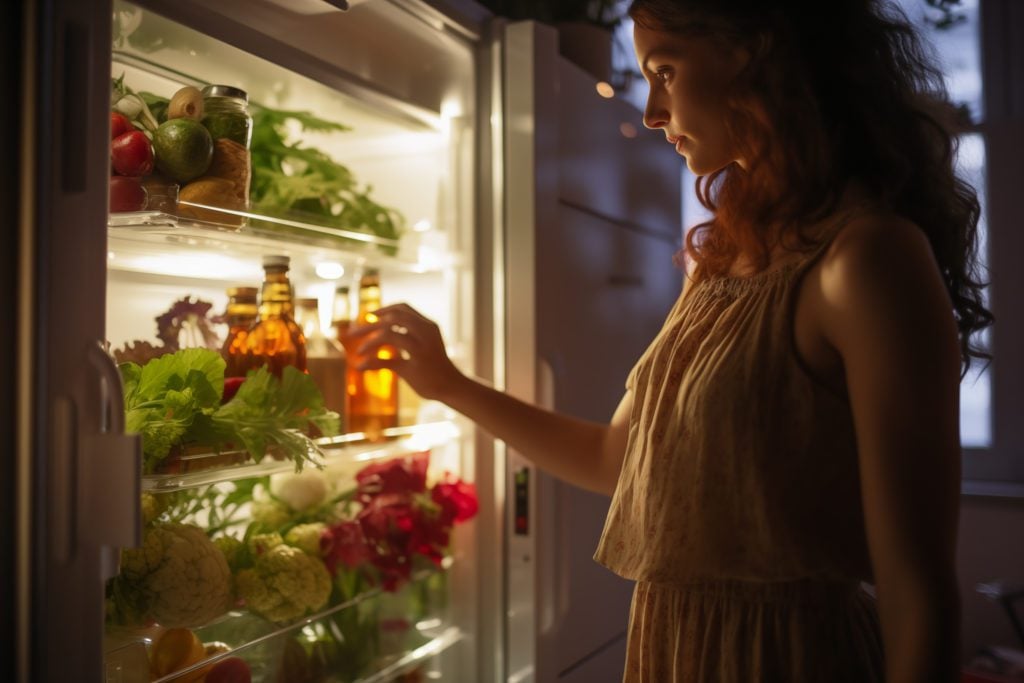
Nutrition and Sleep: Foods That Can Help (or Hinder) Your Rest During Pregnancy
Foods that contain L-Tryptophan and melatonin can improve your sleep during pregnancy while fatty and spicy foods can cause heartburn and interrupt sleep.

Sleepless nights are common when you are pregnant. Approximately 78 percent of pregnant women have trouble sleeping throughout pregnancy. Heartburn, a growing belly, aches and pains, and fluctuating hormones can wreak havoc on sleep.
Taking steps to get better sleep during pregnancy is important for both your mood and energy levels. It’s also essential for health reasons. Pregnant women who don’t get enough sleep during pregnancy are more likely to experience complications like preeclampsia.
There are several causes of insomnia during pregnancy. One of the things that can impact your sleep while pregnant is what you eat. Find out what foods disrupt sleep, as well as ways to get better sleep.
Conditions Impacted By Nutrition That Can Affect Sleep During Pregnancy
There are several conditions that can greatly impact your sleep during pregnancy and beyond. These conditions are influenced by what you eat and drink.
GERD
Gastroesophageal reflux disorder (GERD) is common during pregnancy and can be quite unrelenting. Nine out of ten women experience GERD during pregnancy. This condition causes food and acid in the stomach to back up into the esophagus. GERD can cause nausea, coughing, vomiting, and heartburn. It’s a common cause of a loss of sleep.
Restless Legs Syndrome
Restless legs syndrome (RLS) or Willis-Ekbom Disease is pretty common during pregnancy. It’s estimated that up to 34 percent of pregnant women experience it. It most often occurs during the third trimester but can happen anytime during pregnancy. With RLS, you’ll experience a relentless, uncomfortable urge to move your legs. Symptoms tend to worsen at night. This can make it nearly impossible to sleep (something that is already hard during pregnancy).
While there are likely multiple causes, RLS may be related in part to a lack of certain vitamins and minerals. Eating more foods high in these vitamins may reduce symptoms of restless legs syndrome so that you can sleep better during pregnancy.
- Potassium - Low levels of potassium may contribute to RLS. Foods that have high potassium levels include bananas, leafy greens, and avocados.
- Vitamin D3 - Vitamin D3 deficiency is associated with RLS. Foods high in vitamin D3 include fatty fish and eggs.
- Iron - Low iron levels are often seen in people with restless legs syndrome. Seeds, nuts, dried fruit, and leafy green vegetables are all high in iron.
Pregnancy Nutrition: Do’s and Dont’s for Better Sleep
Here’s the lowdown on nutrition do's and don'ts during pregnancy. Learn what nutrition factors and choices can help you get better sleep.
Do’s
- Eat a healthy dinner: But, avoid eating or drinking within three hours of bedtime. Eating too close to bedtime can disrupt your sleep.
- Take your time when eating: Enjoy your food. Eating too fast increases the risk of having a GERD episode.
- Drink plenty of water throughout the day: Water can have a huge impact on your sleep. It helps keep your body hydrated while you sleep. If you don’t get enough water, it can dry out your nasal passages, leading to nosebleeds while you are trying to sleep.
- Eat small meals throughout the day: This helps you better digest your food.
- Completely cut out caffeine: It’s best to cut caffeine from your diet during pregnancy if you can. Caffeine is a known trigger for restless legs syndrome.
- Elevate your head when you sleep: This can reduce the risk of GERD.
- Try supplements: Studies show that melatonin may help with sleep when you are pregnant. Magnesium supplements have also been shown to help with shut-eye. Always talk to your doctor before using supplements.
- Sleep on your left side: This aids digestion and reduces acid reflux.
Don’ts
- Don’t lie down immediately after eating: Lying down right after eating (as tempting as it might be to do so) can cause indigestion.
- Don’t eat too much or overeat — especially at dinner. Eating to the point where you are so full will cause the stomach to feel bloated. This can open up the esophageal sphincter and allow stomach acids to more easily travel into the esophagus.
- Don’t go to bed hungry: Hunger pangs can keep you up at night. A high-protein snack or warm glass of milk can keep your blood sugar levels up. This can help prevent hot flashes, headaches, and bad dreams.
Foods to Eat During Pregnancy
It’s important to be mindful of what you eat and drink during pregnancy, as it can impact your sleep. The following foods can help acid reflux during pregnancy and help you get a good night’s rest.
- Tart cherries - Consuming tart cherries or tart cherry juice before hitting the hay may help you fall asleep faster and sleep better. That’s because tart cherries have high levels of phytochemicals including melatonin. These phytochemicals also reduce inflammation, which can make you feel more comfortable as you sleep.
- Almonds - Low levels of magnesium are linked to sleep disorders, as well as restless legs syndrome. Almonds are an excellent source of magnesium.
- Greek yogurt - Greek yogurt is perfect for a bedtime snack because it contains L-Tryptophan, which can help induce sleep. And because it’s such a rich source of protein, Greek yogurt can also help you avoid a spike in glucose, which can keep you awake.
- Herbal tea - Drinking herbal tea can help you wind down before bed and sleep better. To avoid middle-of-the-night bathroom trips, make sure you don’t drink too much. Lavender and ginger teas are both good choices to help with insomnia.
- Warm milk with honey - A warm mug of milk is a bedtime classic. That’s because it helps you fall asleep easier. Dairy contains L-Tryptophan, an amino acid that triggers your brain to produce melatonin, a hormone that helps you sleep. Honey also contains L-tryptophan.
Foods to Avoid
The following foods are ones that you want to avoid. They can all trigger acid reflux, which can leave you feeling as though your chest is on fire — something that definitely makes it hard to sleep.
- Carbonated drinks - Soft drinks, carbonated water
- Citrus - Grapefruits, oranges and lemons
- Tomatoes - Salsa and marinara sauce
- Peppermint - Peppermint candy and tea
- Fatty foods - Fried chicken and wings
- Spicy foods - Chili, tacos
- Rich foods and chocolate
You can get better sleep throughout your pregnancy by knowing which foods, snacks, and eating styles can help you catch the most Zzzs and which ones to avoid.
FAQ
Why do I wake up in the middle of the night starving?
Your body is working overtime to grow a baby, so your metabolism is in high gear! Try a small, protein-packed snack before bed (like Greek yogurt or a handful of nuts) to keep your blood sugar steady.
What are some quick and easy pregnancy-friendly meals for better sleep?
Try a turkey and cheese wrap, oatmeal with almonds, or a smoothie with banana and yogurt. These foods contain sleep-friendly nutrients like tryptophan, magnesium, and protein.
Is warm milk before bed actually helpful, or is that just an old wives’ tale?
It’s legit! Milk contains L-Tryptophan, an amino acid that helps your body produce melatonin, the sleep hormone. Add a little honey, and you’ve got a natural sleep aid.
Is it bad to go to bed hungry?
Yes! An empty stomach can lead to low blood sugar, which may cause headaches, bad dreams, or even night sweats. A small, protein-rich snack before bed can help keep things balanced.
Can eating too much before bed cause weird dreams?
Yep! Heavy meals can mess with digestion and cause discomfort, making your sleep lighter and dream cycles more intense. Try eating earlier and keeping nighttime snacks light.

Written by
Emily Mendez
Emily Mendez is a former therapist and mental health author. She is one of the leading voices in mental health. Emily's writing has appeared in eCounseling, SonderMind, and more. Emily is frequently interviewed by Healthline, Fatherly, INSIDER, Family Circle, and other national media for her advice and expert opinion on the latest mental health topics.
Download Pillow
Get help
Press & News
Legal
Connect
X (Twitter)
Company
Copyright © Neybox Digital Ltd.



